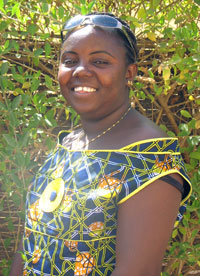News
Protecting their Own: Youth Volunteers in Senegal are a Force for Health
- 08 February 2008
News
TAMBACOUNDA, Senegal — Mamadou Doumboya has an interesting way of spending his free time. Each week he ventures into the traffic-choked squares and intersections of his hometown, shouldering an array of sex education pamphlets, informational videos and condoms. He then hands out the pamphlets, shows the videos, and, if anyone is still confused, demonstrates how to wear a condom—using an appropriately shaped piece of wood as a model.
Hardly a typical afternoon for your average twenty-two-year-old.

But Mamadou is far from average. He's a committed peer educator working here in Tambacounda, a regional capital in this West African nation. His country, though celebrated for its political stability and democratic tradition, remains one of the world’s poorest. Senegal ranked 156 out of 177 countries on the 2006 Human Development Index (UNDP).
Keeping HIV at bay
Senegal also stands out in sub-Saharan Africa for something else: its extremely low HIV infection rate. Less than 1 per cent of the Senegalese population is HIV-positive. Many experts credit this to the government’s long history of fighting HIV and AIDS. In 1986, after epidemiologists diagnosed the first confirmed cases of AIDS, the government established a national AIDS council to fight the disease and has employed aggressive efforts ever since—including focusing prevention efforts on young people.
|
"I have seen that my friends, people I know, are ignorant about HIV/AIDS. That’s why I came here – to help. "
--Mamadou Doumboya
|
Senegal already boasts an extensive school-based sex education programme, a result of cooperation between the government, a Senegalese NGO dedicated to population issues, and UNFPA, the United Nations Population Fund. But these programmes don’t include the large numbers of Senegalese teenagers forced to drop out of school in order to support their families, or those children whose parents have never been able to afford to send them to school.
“I have seen that my friends, people I know, are ignorant about HIV/AIDS,” Mamadou says. “That’s why I came here – to help.”
Offering convenient services for young people
To meet this need, the government and UNFPA have partnered to create 13 adolescent centres, like the one Mamadou works for, across Senegal. The sites serve as all-purpose sexual health and counselling stops for young people with services free of charge. They offer HIV screenings, include support groups for people living with HIV and trained counsellors on hand to provide advice about relationships, sexually transmitted infections and offer guidance for young people dealing with unplanned pregnancies, and a variety of other health-related issues.

Making services and information available is not always enough, however. African countries with high HIV prevalence are often blanketed by anti-AIDS messages that raise awareness but fail to elicit the behaviour change necessary to prevent new cases of infection.
“The information young people need, for the most part, is available,” says Dr. Suzanne Maiga-Konate, UNFPA Representative in Senegal. “The problem now is how to ensure that they take that information to heart and actually change their behavior.”
Speaking frankly about sensitive issues
Enter Mamadou. He and other volunteers take counselling, condoms and health information right to the source. Because they hail from the same neighbourhoods as their target population, these peer educators have access to and insight into the kinds of problems their peers struggle with every day. In more formal settings, even ones as comfortable as the youth centres, educators have a harder time building the trust and intimacy required to bring about the kind of changes that result in lower HIV transmission rates.
But it isn’t easy. Peer educators such as Mamadou have to be comfortable speaking frankly about issues that many in Senegal still struggle to discuss. Sometimes this means overcoming simple embarrassment. Kadidatou Camara, a peer educator in the Kolda region who sports a perpetual smile, had to ask her brother to pass out condoms to his male friends, who were too shy to come to her themselves.
In other instances, such as when Kadidatou staffs the condom distribution booths scattered around town, she has to be even more direct.
“When someone comes to take a condom, I say, ‘Sir, excuse me, but can you tell me how to put on a condom?’” she says—her trademark grin perhaps a little broader than usual. “Sometimes they do, and sometimes they tell you something that is completely wrong. When that happens, I explain.”
The kind of candor and thoroughness that exemplifies Kadidatou’s interrogation of would-be condom-users and Mamadou’s demonstrations permeate the entire peer educator system. Officially on duty only two days a week, these young people are nevertheless always on the job. They wouldn’t have any other way.
“If we just sit back and do nothing, those kids who can’t go to school would never have the chance to learn about these things,” explains another Kolda volunteer, Bacary Gamasso, his voice at once forceful and urgent. “These kids are the ones in danger.”
— Arthur Plews